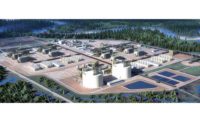The $15-billion Papua New Guinea liquefied natural-gas project has secured several new off-take commitments from energy companies across Asia, leading joint-venture senior partner ExxonMobil to announce it will press ahead with the 435-mile pipeline project. It would represent the largest foreign investment in Papua New Guinea to date and, when the project is completed, will deliver an estimated 6.3 million tonnes of liquefied natural gas per year to customers across east Asia.
PNG LNG, as the project is known, is a joint venture led by Esso Highlands, a subsidiary of ExxonMobil; Oil Search, Santos; the government of Papua New Guinea; and a trustee representing the interests of landowners affected by the project.
Financing for the PNG LNG still is being finalized, but ExxonMobil has signed agreements with Sinopec, China Petroleum & Chemical Co. and Tokyo Electric Power Co. (TEPCO) to accept LNG provided by the project. Negotiations still are under way with Taiwanese utilities for the remainder of the pipeline’s LNG capacity.
Construction currently is slated to begin next year and will involve both on- and offshore work, as well as new processing facilities. The gas fields are located in the highlands in the interior of the island, and the project would integrate several large, undeveloped gas fields as well as several nearby oil fields. The pipeline’s initial stretch will carry LNG to an existing oil export platform at the port of Kopi in the south, while a smaller pipeline will carry oil to an existing processing plant in the interior of the island. The LNG pipeline will continue from the oil platform at Kopi along the seafloor to Port Moresby in southeastern Papua New Guinea, where an extensive new LNG processing facility will be constructed to off-load the gas.
PNG LNG will require approximately 300,000 tonnes of pipe, and ExxonMobil currently is negotiating with Japanese steelmakers to supply the material. LNG PNG is only one of several major liquefied natural-gas projects planned for the region, leading to fears of a labor shortage in 2010 and 2011 as multiple projects get under way. By current estimates, LNG PNG will be operational by late 2013 or early 2014.












Post a comment to this article
Report Abusive Comment